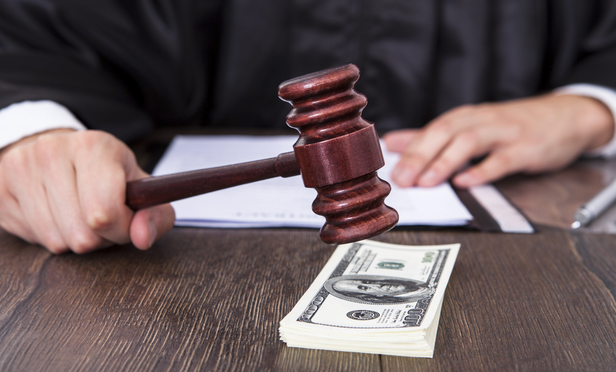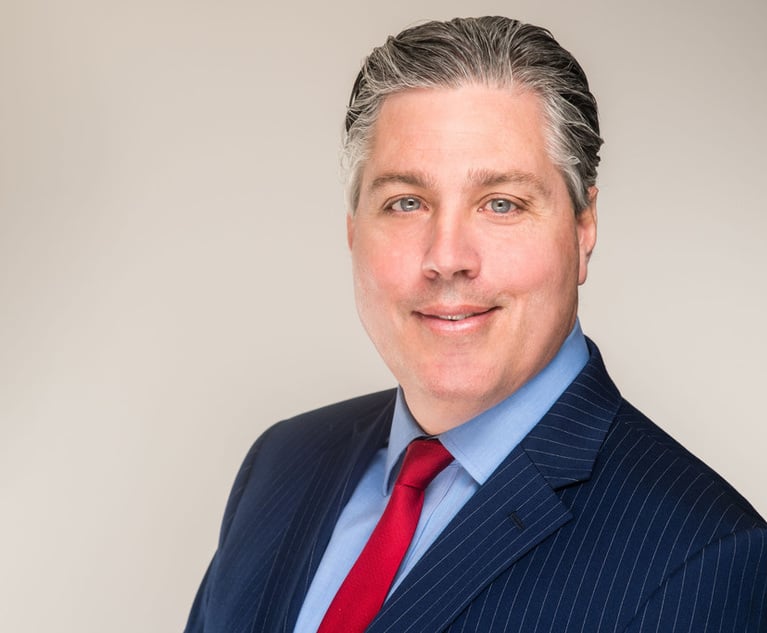Superior Court: Double Recovery Possible Even Where Defendants Aren't Joint Tortfeasors
The Pennsylvania Superior Court has reinforced the idea that a plaintiff's recoveries in separate cases can constitute an unlawful double recovery even if the parties in the two matters were not joint tortfeasors.
January 16, 2020 at 02:02 PM
4 minute read

The Pennsylvania Superior Court has reinforced the idea that a plaintiff's recoveries in separate cases can constitute an unlawful double recovery even if the parties in the two matters were not joint tortfeasors.
In a Jan. 14 memorandum opinion, a three-judge panel unanimously ruled to vacate an Allegheny County judge's $70,000 judgment in favor of two homeowners and against their insurer, State Farm, and FireDEX, the contractor the insurer brought in to fix damage caused during a remodeling project.
The appellate panel found that because the homeowners, Jeffrey and Lee Ann Wenk, had previously settled for an undisclosed amount with D&R Equipment, the original contractor that allegedly caused the damage, the judgment against State Farm and FireDEX in a subsequent lawsuit may have constituted a double recovery.
The Wenks had argued, and the trial court agreed, that State Farm and FireDEX were not entitled to a setoff of any damages recovered in the settlement with D&R because State Farm and FireDEX were not joint tortfeasors in the D&R matter.
But Judge Jacqueline Shogan, joined by Judges Anne Lazarus and Judith Ference Olson, said Superior Court precedent dating back to the 1979 case Lasprogata v. Qualls dictates that plaintiffs cannot recover twice for the same injury, regardless of whether the defendants are joint tortfeasors.
"We conclude the trial court erred in dismissing, as a matter of law, State Farm's and FireDEX's requests for a setoff and instead, should have analyzed the facts of the claims sought in both cases and the settlement reached in [Wenk v.] D&R Equipment, in order to ensure that there was no duplication of recovery," Shogan said. "Therefore, we remand the matter for the trial court to hold an evidentiary hearing to receive additional evidence, if any, and hear argument regarding the injuries and damages claimed in each case, the amounts the Wenks received, and the terms of the release in D&R Equipment."
In Lasprogata, a plaintiff injured in a motor vehicle accident settled a lawsuit against the other driver and then later recovered damages in a separate suit against the doctor who performed surgery to repair his injuries. The Superior Court ruled that, even though the driver and the doctor were not joint tortfeasors, damages recovered from each defendant had to be apportioned to prevent a double recovery.
"The trial court herein improperly limited Lasprogata to bodily injury claims," Shogan said. "Neither the Wenks or the trial court cite authority, nor have we found any, that requires such a narrow view."
The Superior Court panel in Wenk also rejected the plaintiffs' reliance on the court's 2015 ruling in Amato v. Bell & Gossett. The court said that case was distinguishable because it involved contributions from asbestos manufacturers who were alleged to be joint tortfeasors.
"We agree with FireDEX that the Amato court distinguished Lasprogata, which 'recognized the difference between joint tortfeasors[,] whose wrongdoing combined to cause a single harm[,] and successive tortfeasors[, who] caused distinct injuries or damages,' and this court 'allowed apportionment, not contribution,'" Shogan said.
Counsel for the Wenks, Steven Gibbs of Sewickley, said in an email, "We strongly believe that, on several fundamental issues in the case, the Superior Court's decision is contrary to established Pennsylvania law. With respect to each of those issues, we will exhaust every available option to bring this case in line with Pennsylvania law."
"In particular, we will seek to avoid erosion of statutory protections that Pennsylvania enacted to safeguard insureds and homeowners," Gibbs continued. "This case involves at least one novel issue related to an insurer's attempts to avoid compliance with building code standards, and we will continue to seek a result that prevents evasion of building codes and the health and safety protections those codes afford to Pennsylvania citizens. In our view, the opportunity is for clarification and guidance is especially timely in light of recent and pending bad faith decisions in Pennsylvania Supreme Court."
Counsel for State Farm and FireDEX, Louis Long of Thomas, Thomas & Hafer in Pittsburgh, also could not be reached.
This content has been archived. It is available through our partners, LexisNexis® and Bloomberg Law.
To view this content, please continue to their sites.
Not a Lexis Subscriber?
Subscribe Now
Not a Bloomberg Law Subscriber?
Subscribe Now
NOT FOR REPRINT
© 2025 ALM Global, LLC, All Rights Reserved. Request academic re-use from www.copyright.com. All other uses, submit a request to [email protected]. For more information visit Asset & Logo Licensing.
You Might Like
View All


Feasting, Pledging, and Wagering, Philly Attorneys Prepare for Super Bowl
3 minute read
TikTok Opts Not to Take Section 230 Immunity Fight to U.S. Supreme Court
4 minute readLaw Firms Mentioned
Trending Stories
- 1States Accuse Trump of Thwarting Court's Funding Restoration Order
- 2Microsoft Becomes Latest Tech Company to Face Claims of Stealing Marketing Commissions From Influencers
- 3Coral Gables Attorney Busted for Stalking Lawyer
- 4Trump's DOJ Delays Releasing Jan. 6 FBI Agents List Under Consent Order
- 5Securities Report Says That 2024 Settlements Passed a Total of $5.2B
Who Got The Work
J. Brugh Lower of Gibbons has entered an appearance for industrial equipment supplier Devco Corporation in a pending trademark infringement lawsuit. The suit, accusing the defendant of selling knock-off Graco products, was filed Dec. 18 in New Jersey District Court by Rivkin Radler on behalf of Graco Inc. and Graco Minnesota. The case, assigned to U.S. District Judge Zahid N. Quraishi, is 3:24-cv-11294, Graco Inc. et al v. Devco Corporation.
Who Got The Work
Rebecca Maller-Stein and Kent A. Yalowitz of Arnold & Porter Kaye Scholer have entered their appearances for Hanaco Venture Capital and its executives, Lior Prosor and David Frankel, in a pending securities lawsuit. The action, filed on Dec. 24 in New York Southern District Court by Zell, Aron & Co. on behalf of Goldeneye Advisors, accuses the defendants of negligently and fraudulently managing the plaintiff's $1 million investment. The case, assigned to U.S. District Judge Vernon S. Broderick, is 1:24-cv-09918, Goldeneye Advisors, LLC v. Hanaco Venture Capital, Ltd. et al.
Who Got The Work
Attorneys from A&O Shearman has stepped in as defense counsel for Toronto-Dominion Bank and other defendants in a pending securities class action. The suit, filed Dec. 11 in New York Southern District Court by Bleichmar Fonti & Auld, accuses the defendants of concealing the bank's 'pervasive' deficiencies in regards to its compliance with the Bank Secrecy Act and the quality of its anti-money laundering controls. The case, assigned to U.S. District Judge Arun Subramanian, is 1:24-cv-09445, Gonzalez v. The Toronto-Dominion Bank et al.
Who Got The Work
Crown Castle International, a Pennsylvania company providing shared communications infrastructure, has turned to Luke D. Wolf of Gordon Rees Scully Mansukhani to fend off a pending breach-of-contract lawsuit. The court action, filed Nov. 25 in Michigan Eastern District Court by Hooper Hathaway PC on behalf of The Town Residences LLC, accuses Crown Castle of failing to transfer approximately $30,000 in utility payments from T-Mobile in breach of a roof-top lease and assignment agreement. The case, assigned to U.S. District Judge Susan K. Declercq, is 2:24-cv-13131, The Town Residences LLC v. T-Mobile US, Inc. et al.
Who Got The Work
Wilfred P. Coronato and Daniel M. Schwartz of McCarter & English have stepped in as defense counsel to Electrolux Home Products Inc. in a pending product liability lawsuit. The court action, filed Nov. 26 in New York Eastern District Court by Poulos Lopiccolo PC and Nagel Rice LLP on behalf of David Stern, alleges that the defendant's refrigerators’ drawers and shelving repeatedly break and fall apart within months after purchase. The case, assigned to U.S. District Judge Joan M. Azrack, is 2:24-cv-08204, Stern v. Electrolux Home Products, Inc.





